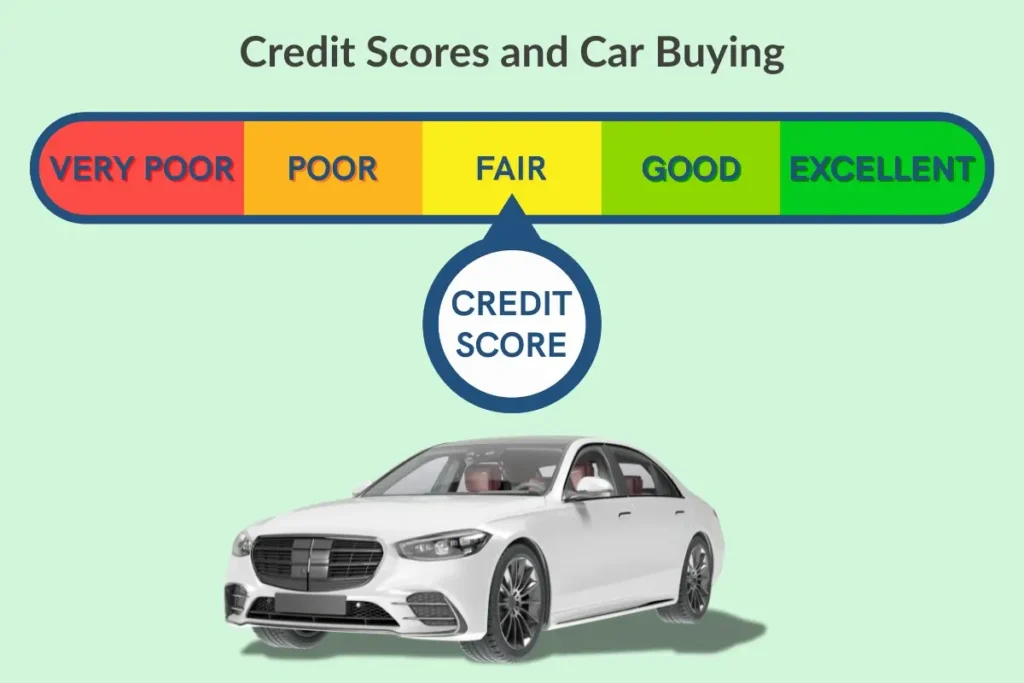What Credit Score Is Needed to Buy a Car

Just as climbing Mount Everest requires different levels of preparation for various routes, securing a car loan demands different credit scores depending on your chosen path. You’ll find that while it’s possible to finance a vehicle with scores as low as 400, you’re likely to face steep interest rates and limited options.
Most lenders prefer scores above 661, and you’ll access the best rates and terms with scores exceeding 781. Before you start shopping for your next vehicle, understanding where you stand on the credit spectrum can save you thousands and help you navigate the complex landscape of auto financing.
Key Takeaways
- There is no universal minimum credit score requirement, but most auto loans go to borrowers with scores above 661.
- Superprime borrowers (781-850) get the best rates, around 5.64% APR for new cars and 7.66% for used cars.
- Traditional banks and credit unions typically prefer scores of 661 or higher for auto loan approval.
- Subprime borrowers (501-600) can still get approved but face higher interest rates between 12.28% and 21.55%.
- Buyers with scores below 500 can explore Buy Here Pay Here dealerships or use co-signers to improve approval chances.
Worried your credit score might hold you back from your next vehicle purchase? New Leaf Financial Services specializes in helping car buyers improve their credit scores to secure better financing rates. Schedule your free credit repair consultation today to learn how we can help you achieve your automotive goals.
Credit Score Categories for Cars
When applying for a car loan, your credit score falls into one of five distinct categories that lenders use to evaluate your creditworthiness.
These credit score categories range from Superprime (781-850) to Deep Subprime (300-500), with significant impacts on your financing options.
The average credit score needed for favorable loan terms is 660. If you’re in the Superprime category, you’ll enjoy the best interest rates and easy loan approvals.
However, if your credit scoring places you in the Subprime range (501-600), you’ll face higher rates and fewer options. Understanding where you stand is essential, as lenders strictly adhere to these categories when evaluating risk.
Prime (661-780) and Nonprime (601-660) borrowers fall between these extremes, with varying degrees of loan accessibility and terms.
Minimum Score Requirements by Lender
Although there’s no universal minimum credit score to buy a car, each lender sets their own requirements based on risk tolerance and business model. Your credit scores affect auto loan approval chances and interest rates considerably.
Most financed cars go to borrowers with scores above 661, but you can still get approved with lower numbers.
Here’s what you’ll typically find across different lenders:
- Traditional banks and credit unions prefer scores of 661 or higher
- Some dealerships may consider scores in the 400-500 range
- Average APRs decrease substantially with better credit scores
- Less than 2% of auto loans go to borrowers with a FICO auto score under 500.
While the minimum credit score needed varies by lender, aiming for at least 600 will improve your credit options and better rates.
Factors Beyond Credit Score
While your credit score plays a major role in car loan approval, lenders evaluate several other essential factors before making their decision. Your payment history and credit utilization demonstrate your reliability with credit, while your income stability and employment history show your ability to make consistent payments.
Auto lenders also consider your debt-to-income ratio to verify you can manage additional car payments.
The vehicle type you choose matters, too – new cars often secure better loan terms than used ones. To better increase your chance of getting a car loan, you can make a larger down payment, which reduces the lender’s risk.
If you’re concerned about approval, consider adding a co-signer with strong credit to your application. This strategy can greatly improve your chances and potentially secure better interest rates.
Struggling to understand how various factors affect your car loan approval? Schedule a free consultation with New Leaf Financial Services today. Our credit repair experts will help you navigate the path to better financing options.
Interest Rates and Score Ranges
Your credit score directly impacts the interest rate you’ll pay on a car loan, creating significant differences in monthly payments and total costs.
Auto loans show clear distinctions in average APR based on score ranges, with super prime borrowers enjoying the lowest rates while deep subprime borrowers face the steepest financing costs.
Here’s how interest rates typically break down across different score ranges:
- Super prime borrowers (781-850) secure the best rates: 5.64% APR for new cars, 7.66% for used, thanks to their excellent credit.
- Prime borrowers (661-780) see moderate rates: 7.01% new, 9.73% used
- Nonprime borrowers (601-660) face higher costs: 9.60% new, 14.12% used
- Subprime and deep subprime borrowers (300-600) encounter the highest rates: 12.28%-14.78% new, 18.89%-21.55% used
Securing Better Auto Loan Terms
Understanding how credit scores affect interest rates leads to the next logical step: improving your loan terms. Your FICO score greatly impacts your ability to secure better auto loan terms.
With a score of 670 or higher, you’ll qualify for lower interest rates and more favorable conditions. Super prime borrowers (781-850) can access new car APRs around 5.64%, while prime borrowers (661-780) face rates around 7.01%.
If you’re a nonprime borrower with scores between 601-660, you could pay up to 9.60% on new cars, considerably increasing your financing costs.
To improve your chances when securing a car loan, consider finding a co-signer with good credit. This strategy can help you obtain loan approval and potentially reduce your interest rates.
Financing Options for Low Scores
Even with a low credit score, you’ve got several financing paths to purchase a car. Your options depend on where your credit score falls and what resources you can leverage to strengthen your application.
Here are your main financing options with a low credit score:
- Subprime loans for scores between 501-600, with average rates of 13.00% for new cars and 18.95% for used vehicles.
- Deep subprime financing for scores 300-500, though rates jump to 15.43% for new and 21.55% for used cars.
- Buy Here Pay Here dealerships that offer direct financing, but typically charge higher fees.
- Co-signer arrangements that can boost your loan approval odds and potentially secure better interest rates.
Making a larger down payment (around 25%) can improve your chances of approval and help you secure more favorable terms.
Building Credit Before Car Shopping
Before diving into car shopping, taking time to build your credit score can greatly improve your financing options and save thousands in interest charges.
To improve your score, focus first on payment history by ensuring all bills are paid on time, as this factor impacts 35% of your credit score. Keep your credit utilization low by maintaining credit card balances below 30% of your limits.
Don’t close old credit cards, as they contribute to your credit history length. Monitor credit reports regularly and dispute any errors you find.
If you’re just starting to build credit, consider secured credit cards – they require a cash deposit but can help establish positive payment history.
These steps, when followed consistently, can strengthen your creditworthiness before approaching auto lenders.
Alternative Auto Financing Solutions
If traditional auto loans seem out of reach due to credit challenges, several alternative financing paths can help you secure a vehicle.
Even with a lower credit score, you’ve got options beyond conventional lenders that can make car ownership possible.
Here are your main alternative financing routes:
- Buy Here Pay Here dealerships offer in-house financing for those with poor credit, though you’ll face higher interest rates.
- Credit unions often provide more favorable auto loan terms to members, even those with bad credit.
- Subprime auto loans specifically cater to credit scores below 600, though they come with higher APRs.
- Peer-to-peer lending platforms connect you with private investors, potentially offering more flexible terms.
Making a substantial down payment of 20-25% can improve your approval odds and reduce monthly payments across any of these options.
Down Payments and Credit Impact
While your credit score plays an essential role in auto financing, making a considerable down payment can greatly improve your chances of approval and secure better loan terms.
If you have a lower credit score, you’ll likely need to put down at least 20-25% to secure financing, particularly if you fall in the subprime range of 501-600. Lenders view larger down payments as reduced risk, often rewarding you with more favorable interest rates and monthly payments.
Those with good credit scores of 670 or higher typically enjoy more flexibility, sometimes qualifying with just 10% down.
Your down payment amount directly impacts your auto loan structure – the more you put down, the shorter your repayment period and the less total interest you’ll pay over time.
Conclusion
Just like a master key opens any door, a credit score above 661 grants better car financing options. You’ll find that building your score is similar to nurturing a garden – it takes time and care, but the results are worth it. Whether you’re aiming for that prime 781+ sweet spot or working with a lower score, remember there’s usually a path to car ownership with the right preparation and persistence.
Let's Build Your Path to Better Credit
Get expert analysis of your credit situation and discover the steps to achieve your financial goals.
Book a ConsultationRealted Posts
What Credit Score Do First-Time Homebuyers Need to Buy a House?
If you’re one of the millions of Americans planning to buy your first home in 2025, you may be wondering what credit score a first-time home buyer needs
How Late Payments Impact Your Credit Report
Let’s consider Sarah, who missed her credit card payment by just 35 days while moving between apartments. Like many consumers, she didn’t realize this single oversight would slash

